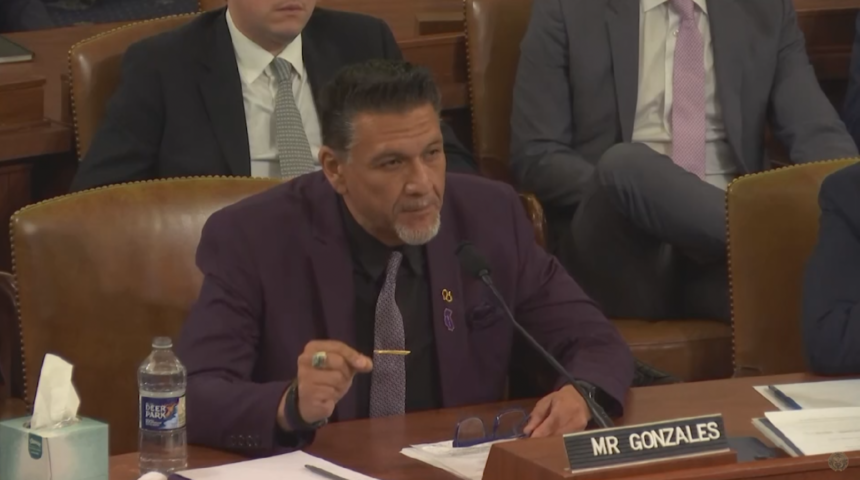Orcutt man speaks at Congress about removing barriers to access Alzheimer’s treatments

WASHINGTON, D.C. -- Orcutt resident Tony Gonzales, who is battling early onset dementia and mild cognitive impairment, spoke to members of a Congressional subcommittee on Wednesday in an effort to persuade lawmakers to help remove barriers that are currently blocking access to treatments for people suffering from Alzheimer's disease.
"I am Tony Gonzales. I am 48-years-old, from Santa Maria, California, and last year, I was diagnosed with mild cognitive impairment," Gonzales said to Congressional members at the start of the hearing. "I know this disease can destroy careers, relationships, and every day it robs me more and more of my memories."
The Santa Maria native is a well-known figure on the Central Coast, through his many years he worked as a popular radio personality, successful business executive, and dedicated community volunteer.
In September 2021, Gonzales spoke to News Channel and publicly disclosed his diagnosis at the age of 47, many years younger than typical for the disease.
On Wednesday, Gonzales appeared on Capitol Hill, speaking for several minutes during a two-and-a-half hearing of the Ways and Means Subcommittee that specifically focused on Examining Policies that Inhibit Innovation and Patient Access.
"Today I am fighting to get the medication that I need so I can live well in my community of Santa Maria, California, and so we had to come all the way to Washington to testify to the Congressional subcommittee of the Ways and Means committee," Gonzales said to News Channel, just minutes after the hearing concluded. "It was an exciting time."
Gonzales, who serves as a national ambassador for the Alzheimer's Association, spoke in opposition regarding the decision last year by Centers for Medicare & Medicaid Services (CMS) to block Medicare coverage of FDA-approved medications for Alzheimer’s disease.
"CMS is restricting access to these breakthrough therapies by creating additional hoops to jump through," said Gonzales during the hearing. "This creates even more of a barrier to care for people living in underserved communities like those in my hometown. This action has a ripple effect as well. Private insurance and health systems follow Medicare's lead. If Medicare won't cover, chances are that other insurances won't either and health systems won't make it available, thus taking more time away from people, including for me and others who aren't on Medicare."
The CMS decision specifically impacts access to a pair of FDA-approved monoclonal antibody treatments, including Leqembi (lecanemab) and Aduhelm (aducanumab).
In December 2022, the Alzheimer’s Association formally asked CMS to provide full and unrestricted coverage for FDA-approved Alzheimer’s treatments, and asked CMS to remove requirements that Medicare recipients must be enrolled in a clinical trial in order to be eligible for FDA-approved treatments.
In response, CMS said in part in a statement, CMS is not reconsidering the national coverage determination (NCD) for Food and Drug Administration (FDA)-approved monoclonal antibodies directed against amyloid for the treatment of Alzheimer’s disease. We recognize that these medications are a unique, new class of drugs, and we regret that the decision could not be more favorable. After careful review of the request and supporting documentation, we are making this decision because, as of the date of this letter, there is not yet evidence meeting the criteria for reconsideration.
"The FDA has approved these treatments as safe and effective," said Beth McMullen, Alzheimer's Association Senior Director of Grassroots Advocacy. "Now CMS, the Centers for Medicare and Medicaid Services has blocked access to these treatments for people on Medicare and when we know that private insurance often times follows what Medicare does, so the decision by Medicare has essentially taken away the opportunity for people like Tony to receive these treatments."
After spending the past few days in Washington, D.C., Gonzales will now head back home to Orcutt and continue his work as a national advocate for those suffering from Alzheimer's and other related diseases.
"I feel like hearing my story gave voice to the many stories across the nation and in our town," said Gonzales. "If we reached one person, if we reached one Senator and we raised one, then it was a success and a great reason to come across this nation to be here."
